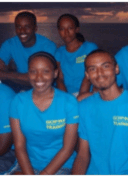CCMI benefits from plastic bag sales
 (CNS): The Central Caribbean Marine Institute (CCMI) has been donated proceeds from the sale of plastic bags from Foster’s Food Fair IGA for the third year running. This year, the proceeds will support the Young Environmental Leadership Course, the Juvenile Nassau Grouper project and the Invasive Lionfish project. The Managing Director of Foster’s Food Fair IGA, Woody Foster expressed his support for CCMI, saying, “Making a difference in the lives of young people and helping to protect the environment are very important to us here at Foster’s Food Fair, IGA. Therefore, we are more than happy to do our part and donate the sales of our plastic bags.”
(CNS): The Central Caribbean Marine Institute (CCMI) has been donated proceeds from the sale of plastic bags from Foster’s Food Fair IGA for the third year running. This year, the proceeds will support the Young Environmental Leadership Course, the Juvenile Nassau Grouper project and the Invasive Lionfish project. The Managing Director of Foster’s Food Fair IGA, Woody Foster expressed his support for CCMI, saying, “Making a difference in the lives of young people and helping to protect the environment are very important to us here at Foster’s Food Fair, IGA. Therefore, we are more than happy to do our part and donate the sales of our plastic bags.”
Ten Caymanian students will get the opportunity to participate in CCMI’s Young Environmental Leadership Course (YELC), which aims to introduce them to the role of the environment in everyday life, including it’s economic significance. The students spend two weeks at the Little Cayman Research Centre (LCRC) working alongside scientists and researchers, while learning about conservation and marine science. All participants are trained by professionals throughout the course to complete their dive certification up to instructor level.
In addition to dive training, YELC introduces its students to marine conservation theory, the marine environment and tourism, including environmental threats. Each theory class is supported with vocational experience, to enable students to apply what they learn in a practical setting. Local business owners in Little Cayman help YELC students understand how the environment and the community are closely linked. Work experience placements are provided for students on completion of the course.
Early in 2012 juvenile Nassau Groupers were discovered by the CCMI team in shallow lagoons around Little Cayman. These fish are economically and ecologically important, but are listed as endangered. The discovery of juvenile grouper has led to a joint project with the Cayman Islands Department of the Environment intended to describe and map the fish’s habitat preference around Little Cayman.
Since 2011, CCMI and the University of Florida have collaborated to study several aspects of the invasion of the Indo-Pacific Red Lionfish. The Red Lionfish has ‘invaded’ waters throughout the Caribbean, where its presence is thought to threaten the ecological balance of native species in the region. Lionfish culls are carried out weekly in Little Cayman and to minimise numbers. The CCMI hosts an annual lionfish culling tournament, which is open to the public in Grand Cayman. With the support of Foster’s Food Fair IGA and the Guy Harvey Ocean Foundation, native fish surveys and diet analysis will continue through 2013, which will give CCMI scientists a robust dataset with which to draw new conclusions about the impacts of the invasive lionfish in Little Cayman and help them minimize these impacts.
A spokesperson from the CCMI said, “Funding is extremely important to the work that we do at CCMI and without the support of incredible sponsors like Foster’s Food Fair IGA, we would not be able to continue with our long-term research and community projects.”
Category: Science and Nature

